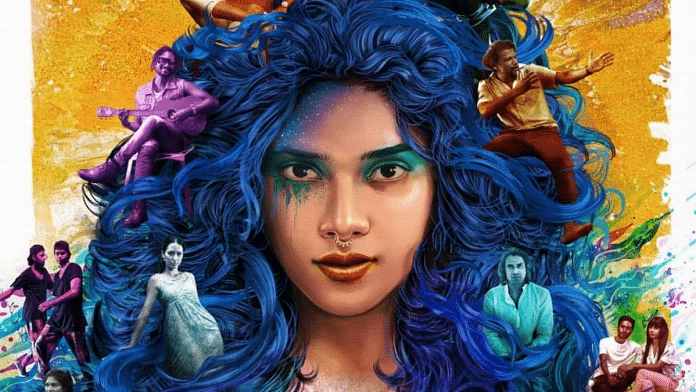Much like most of his films, Pa. Ranjith’s latest release Natchathiram Nagargiradhu reflects on the searing realities of caste, class, sexuality, and gender in society. In what might be his best work in a decade-long career in Tamil cinema, he lays bare the politics of love and how ancient social norms guard the endogamy of love.
With a duration of nearly three hours, the film is about a multicultural theatre group based in Puducherry. While sitting with his crew members, the director flirts with an idea of a stage play about contemporary love. Within seconds, a myriad of interpretations and beliefs come afloat. Someone says, “love is complicated”, while the other underlines that physical attraction is the premise of love. The discussion heats up when a misogynistic character Arjun (Kalaiyarasan) throws shade on “modern love”. Opinions pour in, projecting individual biases and lived experiences until a pivotal character Rene (Dushara Vijayan) says that love is “political”. That, perhaps, is the recurring message of Ranjith’s seventh film.
The troupe stumbles upon a roadblock as it can’t bring up caste nomenclature in the stage play. So, they introduce a metaphor — kaatu poonai (wild cat) and naatu poonai (domesticated cat) — to demonstrate caste hierarchy.
Natchathiram Nagargiradhu begins as a love story between two heterosexual characters, Rene and Iniyan (Kalidas Jayaram). But just as in any other Pa. Ranjith film that surfaces on a wide-angle shot, you know you are in for a cinematic treat. The film is a democratic chaos of unadulterated voices and a unique take on love. As filmmaker Anurag Kashyap rightly pointed out, Rene “imbibes the spirit of Pa. Ranjith”. He called the film his favourite Ranjith directorial creation wherein he has been “the most vulnerable”. A picture of the Hindi filmmaker hugging the Tamil director went viral minutes after a special screening ended in Mumbai.
Also read: You keep hoping Vijay Deverakonda’s ‘Liger’ will get better. It never does
‘Harmless’ love to enlightenment
In the opening scene of Natchathiram Nagargiradhu, Rene and Iniyan lie comfortably next to each other while a Nina Simone song plays on Iniyan’s phone. After a while, Rene turns it off and begins to hum Ilaiyaraaja’s En Vaanile, a song from Johnny (1980) — a film that portrayed a woman’s life rigged with an identity crisis. While Iniyan repeatedly asks her to stop singing, Rene defends her love for Ilaiyaraaja enthusiastically. From the face of it, one might not pay much attention to a seemingly harmless feud between two lovers. But everything in Ranjith’s cinematic universe — from song to gesture — is carefully crafted and consciously inserted to make a statement. The ‘harmless’ lovers’ spat escalates as Iniyan continuously brings up Rene’s Tamizh (Dalit) birth name and takes a dig at her social identity. Rene has had enough — she walks out of the relationship.
Just as Rene is forthright and clear about her priorities in life, she also understands that bringing down the walls of caste and class privilege is a mammoth task. Arjun, who is introduced in the film as a transphobic, casteist, sexist, and homophobic character, misbehaves with Rene at a party besides insulting many other colleagues. The next day, he realises his mistakes and apologises, but the play director asks him to pack up. Rene stops him and says, “Political correctness will not come in a day’s time.” Arjun stays back, unlearns, and relearns the language of a progressive world. Step by step, he breaks free from the shackles of his patriarchal and conservative upbringing.
Natchathiram Nagargiradhu is the cathartic journey of Rene and, by extension, Ranjith’s. In one scene, she speaks about her day-to-day hardships while growing up with upper-caste people around. While she is not ashamed of her social background, she also does not like to be addressed by her birth name. She prefers to be known by the name she chose for herself and respected for the life she built. Dazed by Rene’s staunch political beliefs, a character asks her at one point, “Are you a Communist?” “I am an Ambedkarite,” she shoots back with a wide smile while eating beef fry from a plate. Vijayan is the perfect choice for the role as she brings forth Rene’s vulnerability and ferocity in equal measure.
Much like this open-ended discussion on varied descriptions of love, all characters are treated as components that unite when a threat looms large. “The universe is so large that we are just tiny particles,” says a character. That dialogue defines the core principle of Natchathiram Nagargiradhu.
Even in the representation of queer characters and their reception in society, Ranjith has not tried to paint a sanitised picture. “Families have tried to take queer individuals to psychiatrists to cure them, but that’s not how it works,” said Ranjith while defending the choice to portray the troublesome behaviour of people in dealing with queer identity.
A week ago, pan-India superstar Dhanush’s film Thiruchitrambalam reiterated the simple and rooted language of love. Natchathiram Nagargiradhu is far from Thiruchitrambalam, but the intention behind the filmmaking is the same — it is authentic, universal, and relatable. After a series of action entertainers, Ranjith has returned to this genre — after Sarpatta Parambarai (2021) — with more finesse and purity.
(Edited by Humra Laeeq)



